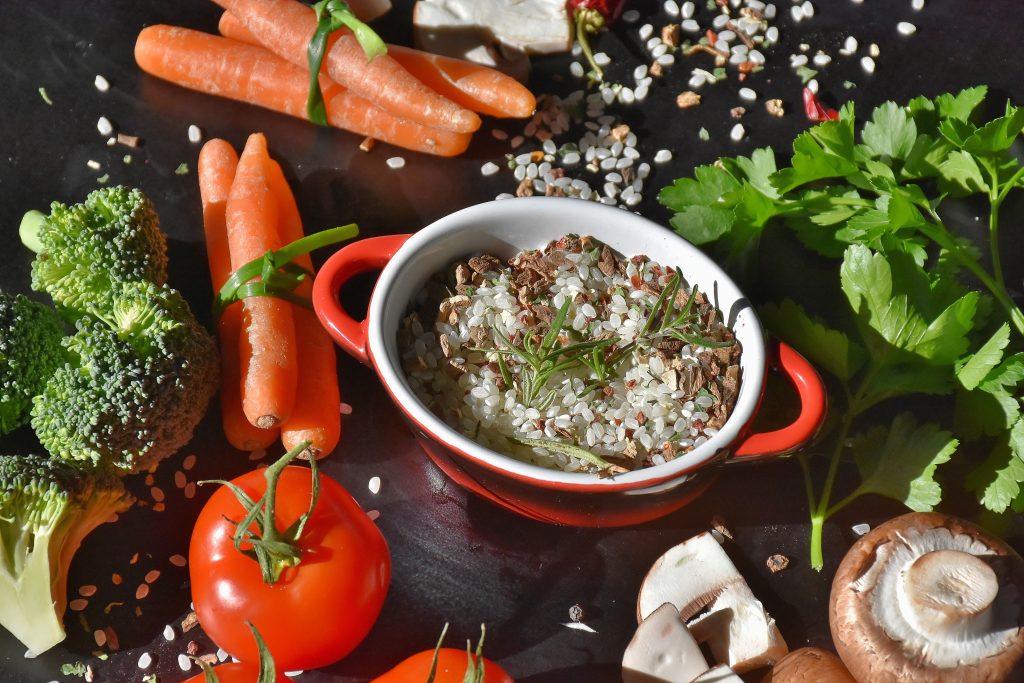Discover how adopting a vegetarian lifestyle can help alleviate chronic pain.
Exploring the Benefits of Vegetarianism for Chronic Pain Management
Living with chronic pain can be a real bummer. It’s like having an annoying sidekick that never leaves your side. But fear not! There may be a delicious and nutritious solution lurking in the world of vegetarianism. In this article, we’ll dive deep into the connection between vegetarianism and chronic pain management. Get ready for some mind-blowing information that might just change your life!
Understanding Chronic Pain

Before we start talking about vegetarianism, let’s take a moment to understand chronic pain. It’s not just your regular everyday pain from stubbing your toe or getting a papercut. Chronic pain goes above and beyond, lingering for weeks, months, or even years. Ouch! So, what’s causing this pain party in your body?
Chronic pain is a complex and multifaceted experience that can have a profound impact on a person’s quality of life. It is characterized by persistent discomfort that often defies conventional treatment methods. Unlike acute pain, which serves as a warning sign for injury or illness, chronic pain persists long after the initial cause has healed.
The Science Behind Chronic Pain
Prepare to have your mind blown! Chronic pain is like a misbehaving kid at a birthday party – it just won’t quit. Believe it or not, it’s actually the result of your nervous system going haywire. From misfiring neurons to overactive pain receptors, chronic pain is a complex and intriguing phenomenon that scientists are still trying to crack.
When you stub your toe or cut your finger, specialized nerve endings called nociceptors send signals to your brain, alerting it to potential danger. In response, your brain releases chemicals that amplify the pain signals, making you acutely aware of the injury. However, in the case of chronic pain, this process goes awry.
Researchers have discovered that chronic pain can be caused by a variety of factors, including nerve damage, inflammation, and changes in the brain’s chemistry. It is believed that repeated exposure to pain can alter the way the nervous system functions, leading to a heightened sensitivity to pain signals. This phenomenon, known as central sensitization, can perpetuate the cycle of chronic pain even in the absence of an ongoing injury.
Common Causes of Chronic Pain
There are countless reasons why chronic pain might be crashing your party. It could be due to an injury that never fully healed, a pesky illness, or even mysterious conditions like fibromyalgia. Whether it’s your back, your head, or your entire body screaming at you, chronic pain is a formidable foe that can really put a damper on your daily life.
Injuries, such as fractures, sprains, or strains, can sometimes lead to chronic pain if the affected tissues fail to heal properly. Conditions like arthritis, which involve inflammation and damage to the joints, can also result in persistent discomfort. Additionally, chronic pain can be a symptom of underlying medical conditions, including autoimmune disorders, nerve disorders, and certain types of cancer.
Fibromyalgia, a chronic condition characterized by widespread musculoskeletal pain, fatigue, and sleep disturbances, remains a mystery to medical professionals. Despite ongoing research efforts, the exact cause of fibromyalgia is still unknown. However, it is believed to involve a combination of genetic, environmental, and psychological factors.
Managing chronic pain requires a comprehensive approach that addresses both the physical and emotional aspects of the condition. Treatment options may include medication, physical therapy, psychological interventions, and lifestyle modifications. It is important for individuals experiencing chronic pain to work closely with healthcare professionals to develop a personalized treatment plan that suits their specific needs.
The Basics of Vegetarianism
Alright, now that we’ve got the pain part covered, let’s dig into the world of vegetarianism. Vegetarianism is like a hipster club for people who want to live that plant-powered life. But don’t worry, you don’t have to wear flannel or grow an ironic mustache. You just have to embrace the power of plants!
When you become a vegetarian, you’re not just making a dietary choice, you’re joining a movement. Vegetarianism has a rich history that dates back thousands of years. Ancient civilizations like the Greeks and Indians practiced vegetarianism as a way to promote health, spirituality, and compassion for all living beings. Today, vegetarianism is gaining popularity as more and more people are becoming aware of the environmental and ethical implications of meat consumption.
Different Types of Vegetarian Diets
Vegetarianism is not a one-size-fits-all kind of deal. There are more options than a buffet of veggie treats! From lacto-vegetarians who indulge in dairy products to pescatarians who say yes to fish, there’s a vegetarian diet for everyone. Let’s explore some of the different types of vegetarian diets:
- Lacto-vegetarian: This diet includes dairy products such as milk, cheese, and yogurt, along with plant-based foods.
- Ovo-vegetarian: Ovo-vegetarians consume eggs in addition to plant-based foods.
- Lacto-ovo-vegetarian: This diet includes both dairy products and eggs, along with plant-based foods.
- Pescatarian: Pescatarians include fish and seafood in their vegetarian diet.
- Vegan: Vegans follow a strict plant-based diet, excluding all animal products, including dairy, eggs, and honey.
So, find your veggie soulmate and get ready to embark on a tasty adventure! Whether you choose to be a lacto-vegetarian, a pescatarian, or a full-blown vegan, there’s a world of delicious vegetarian dishes waiting to be explored.
Nutritional Considerations for Vegetarians
Now, let’s address the elephant in the room – or should I say, the lack of meat on your plate? Many people worry that vegetarian diets might be lacking in essential nutrients. But fear not, my friend! With a little bit of planning and a whole lot of colorful fruits, veggies, grains, and legumes, you can meet all your nutritional needs and then some!
When following a vegetarian diet, it’s important to ensure you’re getting enough protein, iron, calcium, vitamin B12, and omega-3 fatty acids. Luckily, there are plenty of plant-based sources for these nutrients. Legumes like lentils, chickpeas, and black beans are packed with protein and iron. Leafy greens such as spinach and kale are excellent sources of calcium. For vitamin B12, fortified plant-based milk and nutritional yeast are your go-to options. And when it comes to omega-3 fatty acids, flaxseeds, chia seeds, and walnuts are your new best friends.
But it’s not just about meeting your nutritional needs; it’s also about enjoying a diverse and flavorful diet. As a vegetarian, you have the opportunity to explore a wide variety of fruits, vegetables, grains, and spices from around the world. From Indian curries to Mexican tacos, the possibilities are endless!
So, don’t let the naysayers discourage you. Vegetarianism is a lifestyle that promotes health, sustainability, and compassion. By embracing the power of plants, you’re not only nourishing your body but also making a positive impact on the planet. So, grab your apron and get ready to whip up some mouthwatering vegetarian creations!
The Connection Between Diet and Pain
Okay, now let’s dive into the juicy part – the connection between what you eat and how you feel. Turns out, our food choices can have a big impact on inflammation and pain perception. So, grab your fork and let’s dig into this tasty topic!
But before we delve deeper, let’s take a moment to understand what inflammation really is. Inflammation is the body’s natural response to injury or infection, and it involves a series of complex biological processes. When inflammation becomes chronic, it can lead to a variety of health issues, including pain.
How Food Affects Inflammation
Picture this: your body is a battleground, and inflammation is the enemy. But fear not, brave warrior! Certain foods, like processed meats, sugar, and unhealthy fats, can fuel the flames of inflammation. These foods contain pro-inflammatory substances that can trigger the release of inflammatory molecules in the body, leading to increased pain sensitivity.
On the other hand, a plant-based diet can be your secret weapon, armed with anti-inflammatory powers to calm the storm raging within! Fruits, vegetables, whole grains, and legumes are rich in antioxidants, fiber, and phytochemicals that can help reduce inflammation and alleviate pain. These foods also provide essential nutrients that support overall health and well-being.
Additionally, omega-3 fatty acids found in fatty fish, walnuts, and flaxseeds have been shown to have anti-inflammatory properties. Incorporating these foods into your diet can help keep inflammation at bay and potentially reduce pain levels.
The Role of Antioxidants in Pain Management
Imagine a group of superheroes swooping in to save the day – that’s antioxidants for you! These mighty molecules fight against oxidative stress, which can contribute to pain and inflammation. Oxidative stress occurs when there is an imbalance between the production of free radicals (highly reactive molecules) and the body’s ability to neutralize them with antioxidants.
Guess what? Plant-based foods are chock-full of antioxidants, making them the caped crusaders of pain management. Antioxidants help neutralize free radicals, preventing them from causing damage to cells and tissues. By reducing oxidative stress, antioxidants can help alleviate pain and inflammation, promoting better overall health.
Some of the best sources of antioxidants include berries, dark leafy greens, nuts, seeds, and colorful fruits and vegetables. These foods not only add a burst of flavor to your plate but also provide a wide range of antioxidants that can support your body’s natural defense against pain and inflammation.
Vegetarianism and Chronic Pain: What Does the Research Say?
Alright, now it’s time to roll up our sleeves and get nerdy with some research. What does science have to say about the connection between vegetarianism and chronic pain? Buckle up, because the results might just surprise you!
Vegetarian Diets and Inflammation Reduction
Get ready to celebrate, because research suggests that vegetarian diets might be able to lower inflammation levels in the body. Who knew that swapping out burgers for beetroot could make such a difference? So go ahead, grab that salad bowl and let your taste buds join the anti-inflammatory party!
Impact of Plant-Based Diets on Pain Perception
Now, here’s where things get interesting. Some studies have shown that adopting a plant-based diet might lead to a decrease in pain perception. That means less ouch and more yum in your life! Whether it’s the anti-inflammatory properties of plants or some other magical mechanism, one thing’s for sure – plants have some serious pain-busting potential!
Transitioning to a Vegetarian Diet for Pain Management
Okay, you’ve made it this far, and I’m proud of you! Now, let’s talk about how to make a smooth transition to a vegetarian diet for pain management. Don’t worry, I’ve got your back like a trusty sidekick!

Tips for a Smooth Dietary Transition
- Start slow and steady – there’s no need to dive headfirst into the veggie pool. Begin by incorporating more plant-based meals into your weekly repertoire.
- Experiment with flavors – try out new herbs, spices, and mouthwatering recipes to keep your taste buds entertained.
- Don’t forget the protein – plant-based sources like tofu, tempeh, legumes, and quinoa are your meat-free muscle builders.
- Listen to your body – pay attention to how different foods make you feel. Everyone’s body is unique, so find what works best for you.
Overcoming Challenges in Dietary Changes
It’s not all rainbows and butterflies on the vegetarian journey. There may be bumps along the way, but fear not! I’m here to help you navigate through the storm. Whether it’s dealing with cravings or handling the curious looks from Aunt Martha at Thanksgiving dinner, together we can overcome any challenge that comes your way!
And there you have it, folks – a tantalizing glimpse into the world of vegetarianism and its potential benefits for chronic pain management. Now, go forth, armed with knowledge and a veggie-packed plate, ready to conquer that pain once and for all. Happy veggie adventures!







